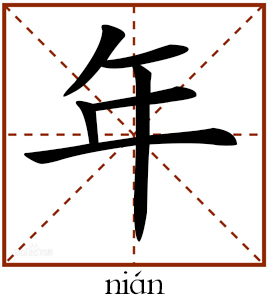year

This character usually refers to a year. The Spring Festival is also called “nian,” which is believed to originate from a Chinese myth. Nian was the name of a furious monster that lived in ancient times. Every year at the beginning of the Chinese New Year, it came out of its hiding place to feed, mostly on men and animals. It is said that many festive traditions originate from plans to intimidate the Nian.
新年都未有芳华
xīn nián dōu wèi yǒu fāng huá
Xin means “new” and nian refers to a year. Xin nian is often known as New Year. Wei you means “not” and fang hua refers to blossoms. This term says that nothing blooms during the Chinese New Year.
This is a line from the poem “Spring Snow” by Han Yu (768–824), master of Chinese prose, outstanding poet, and the first proponent of what later came to be known as Neo-Confucianism. “The new year has yet no fragrant blossoms,/ But the second moon suddenly sees the grass sprouting;/ The white snow, vexed by the late coming of spring’s colors,/Of set purpose darts among the courtyard’s trees to fashion flying petals” (trans. Robert Kotewell & Norman Smith).
This is a poem of welcoming the spring season. The days around the Chinese New Year are often seen as the beginning of spring, yet this is not the time plants bloom in northern China. However, in the poem, Han can hardly wait to appreciate the flowers in bloom because he used to live in southern China, where flowers bloom earlier. Though flowers don’t appear in the second lunar month, Han is surprised by the newly grown grass, a sign of new life.
The last half of the poem is full of romance. When the snow starts to fall, Han imagines that the white snow whirls through the courtyard tree like flying flower petals because it is also eager to embrace the vernal scene. Although a sense of spring has not yet appeared, the poet expresses his merry feelings towards the snow, which is a feast for the eyes. This poem doesn’t contain images of spring, but it creates a spirit of cheer out of the expectation for the spring, a season full of nature’s beauty.
edited by REN GUANHONG
